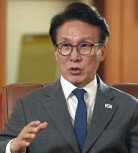WRSA Program to Be Scrapped in 2006
WRSA Program to Be Scrapped in 2006
Posted April. 08, 2005 23:32,
On April 8, it was uncovered that the U.S. notified the Defense Ministry of Korea a year ago that it would abandon the maintenance program of War Reserve Stock for Allies (WRSA). The U.S. had been keeping WRSA in Korea as part of preparations for any possibly military conflict on the Korea peninsula.
As ammunition accounts for 99% of WRSA, should the U.S. withdraw the entire savings of WRSA, the war capabilities of South Korea could be undermined. However, the U.S. informed Korea of its decision without prior consultation, and the Korean government has not disclosed the cancellation for a year. Some speculate the unilateral action by the U.S. and the Korean governments silence could reflect the somewhat strained military relations between the two allies.
The Abandonment of WRSA Program
On April 8, according to the explanation from the U.S. Forces Korea (USFK), in May last year, Deputy Secretary of Defense Paul Wolfowitz had sent to then Korean defense minister Cho Young-gil a letter that the U.S. would end the WRSA Program by December 2006.
It was reported that the U.S. had mentioned that WRSA is no longer needed considering Koreas economic strength. The logic is that now Korea has economically grown enough to handle its own security costs.
According to what has been revealed, the U.S. has been raising questions to Korea on how to deal with the WRSA issue since 2000. In addition, a relevant bill is pending in U.S. Congress. Any overseas sale, disposal or transport of WRSA should be approved by the Congress.
Another Point of Contention between Korea and America?
The USFK has denied any rumor of discord between the military authorities of the two nations, stressing that the cancellation of the WRSA Program has nothing to do with the recent negotiations on defense cost sharing. And they also corrected the news report that America has demanded a WRSA purchase of Korea.
An official in the Defense Ministry, too, said, The ammunition that we hold as WRSA can be manufactured in Korea. Moreover, most of it is more than 20 years old, and the storage is never easy.
Still, there are several suspicious points. The ammunition in WRSA makes up 60 percent of all the ammunition used in wartime. Without the WRSA ammunition, the Korean forces cannot secure more than the amount that meets their needs for 10 days. The amount stands at only one sixth of the storage target set by the Korean forces. In fact, the U.S. is so well aware of the situation that it is under suspicion that the U.S. authorities purposefully have brought up the issue of WRSA abandonment, an issue that might cause security uncertainty in Korea. To make matters fishier, the timing is critical.
Last year, Korea and the U.S. disagreed on the matter of the costs of establishing C4I system (Command, Control, Communication, Computer and Intelligence). By the same token, the U.S. might have expressed its will that it will not tolerate Koreas security free ride any longer, others suspect.
Another question mark lies in the fact that America wants to scrap the WRSA Program, while having declared its plan to invest $11 billion in order to boost the USFKs war capabilities, instead of the reduction of the U.S. troops stationed in Korea.
Sang-Ho Yun ysh1005@donga.com





![[천광암 칼럼]장동혁은 대체 왜 이럴까](https://dimg.donga.com/c/138/175/90/1/wps/NEWS/IMAGE/2026/02/22/133399127.1.jpg)

